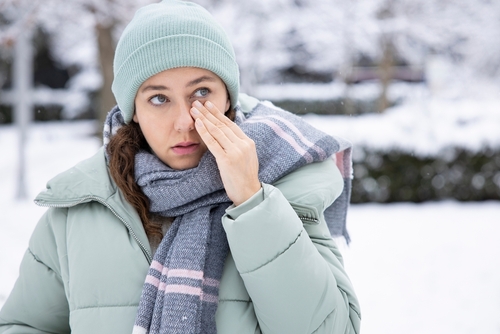
The winter season, with its cold and often harsh weather, is a time when many of us experience a familiar discomfort: dry eyes. As the temperature drops, so does the moisture in the air, leading to a host of issues, one of the most common being dry eyes.
The chill winds, dry indoor heat, and low humidity can make our eyes feel dry, irritated, and uncomfortable. Despite the discomfort, the good news is that winter dry eyes are manageable. With proper knowledge about the causes, symptoms, and treatment options, you can effectively deal with this condition and keep your eyes comfortable and healthy throughout the winter season.
Causes of Dry Eyes in Winter
The primary culprit behind dry eyes in winter is the reduced moisture in the air. Cold, dry air can evaporate the tear film—a thin layer of moisture that coats the surface of our eyes—leading to dryness and irritation. Indoor heating systems that we use to stay warm during the winter also suck the moisture out of the air, further contributing to dry eyes.
Symptoms of Dry Eyes
Winter dry eyes can present a variety of symptoms. The most common are a feeling of dryness, grittiness, or a burning sensation in the eyes. Some people also experience sensitivity to light, blurred vision, and an increased tendency to tear up.
Ironically, watery eyes can be a symptom of dry eyes. This is because when the eyes are dry, they may overproduce tears as a protective response.
Strategies to Help Dry Eyes
One of the most effective prevention strategies is to maintain a humid environment. Using a humidifier in your home or office can help increase the moisture levels in the air, reducing the evaporation of the tear film on your eyes.
Lifestyle changes can also be beneficial. These may include adjusting your diet to include foods rich in omega-3 fatty acids, which can help to improve tear quality, or quitting smoking, which can worsen dry eye symptoms.
Another helpful strategy is to stay hydrated. Drinking plenty of water can help to keep your body – including your eyes – properly hydrated. Additionally, wearing sunglasses or goggles when outside can protect your eyes from the drying effects of the wind and cold.
Lastly, if you're a contact lens wearer, consider switching to glasses during the winter months or using contact lenses that are designed for dry eyes. Taking regular breaks from screen time can also help to reduce eye strain and dryness.
When to Seek Professional Help
While dry eyes in winter can often be managed with home remedies and over-the-counter treatments, there are instances when professional help should be sought. If you're experiencing severe discomfort, persistent symptoms, or if your dry eyes are accompanied by other concerning symptoms such as intense redness, pain, or changes in vision, it's important to consult with an eye care professional.
Eye doctors can provide a thorough examination, diagnose the underlying cause of your dry eyes, and recommend the most appropriate treatment plan. Remember, your eyes are precious, and taking the initiative to seek professional help when needed can go a long way in preserving your eye health.
Why Regular Eye Check-ups Matter
Regular eye check-ups play a crucial role in managing dry eyes, especially during the winter months. These check-ups can help to identify any changes in your eye health, monitor the progress of your treatment, and adjust your management plan as necessary.
Regular check-ups also provide an opportunity for you to discuss any concerns or questions you may have about your eyes with your eye care professional. This open communication can help to ensure that your treatment plan is tailored to your specific needs and lifestyle, leading to more effective management of your dry eyes.
Managing Winter Dry Eyes Effectively
Dry eyes in winter is a common condition that can cause discomfort and disrupt daily activities. With a good understanding of the causes, symptoms, and available treatment options, it can be effectively managed. Remember to take preventive measures, stay hydrated, protect your eyes from harsh winter conditions, and don't hesitate to seek professional help when needed.
If your dry eye symptoms are exacerbated during the winter season, consult our professionals at Hunter Family Vision in our Leawood or Prairie Village, Kansas office. Call or text (913) 681-8555 or (913) 381-2323 to schedule an appointment today. For after-hours emergency care, please call (913) 204-0239.











